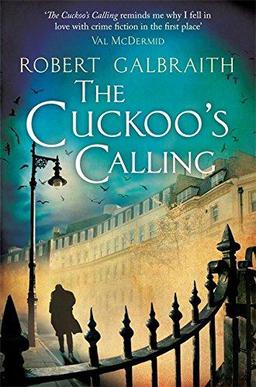
It is presumable that some of you already know the answer to the above question. But first let me explain, at least for the ignorant among you, why this Robert Galbraith is a problematic person.
On April 18th, 2013 a crime novel called ‘The Cuckoo’s Calling’ was published by Sphere, an imprint of Little, Brown Book Group in London. As stated on the cover, the author used a pseudonym: Robert Galbraith. The novel’s protagonist is private detective Cormoran Strike. a veteran who lost a leg in the Afghan War, being assisted in his investigations by his female secretary Robin Ellacott. The book was well received by readers and press. At least, taken in consideration that it was the author’s first publication. But was it?
Born in 1968, Robert Galbraith is married with two sons. After several years with the Royal Military Police, he was attached to the SIB (Special Investigation Branch), the plain-clothes branch of the RMP. He left the military in 2003 and has been working since then in the civilian security industry. The idea for protagonist Cormoran Strike grew directly out of his own experiences and those of his military friends who have returned to the civilian world. ‘Robert Galbraith’ is a pseudonym.
(This biography was on the publisher’s website in 2013 according to The Huffington Post)
On July 9th of that same year a person called Judith Callegari twittered that the author was J.K. Rowling, the world-famous writer of the Harry Potter novels. The Sunday Times, a ‘quality’ British national newspaper, investigated the rumour and found that Robert Galbraith was indeed a pen name for Joanne Rowling. The article on the subject was published a few days after the tweet, on July 14th. Chris Gossage, partner of Russells Sollicitors, had revealed the identity of the author in a private conversation with his wife’s best friend, the above mentioned Judith Callegari. The publisher confirmed the story by The Sunday Times and stated that it was not a leak or part of a marketing campaign. Russels Sollicitors (Rowling’s own lawyers) apologised for the uncovering of her alter ego by one of its employees, who was fined £1,000 for breach of confidentiality.
Rowling was not happy with the news: ‘I had hoped to keep this secret a little longer because being Robert Galbraith has been such a liberating experience. It has been wonderful to publish without hype or expectation and pure pleasure to get feedback under a different name.’ All this being said, sales rocketed and The Cuckoo’s Calling quickly became the best-selling novel on Amazon.
During the investigation on the authorship The Sunday Times received the help of two computer scientists, Patrick Juola and Peter Millicam, who used stylometry in analyzing the text of the novel. Stylometry and Hierarchical Cluster Analysis (HCA) are often employed to determine the identity of an unknown author. Malte Rehbein and Christian Thies, in their contribution on ethics in a German book on Digital Humanities, ask themselves whether this is a positive development. What is the use of a pseudonym if science can easily discover the real identity of an author who tries to keep out of publicity? What about privacy and anonymity? Rowling was not asked for her ‘informed consent’.
The technique of stylometry is also being used in forensic science and criminal investigations. But secret services certainly won’t ask anyone’s permission. I’m pretty sure Robert Galbraith knew about all this when working with the Special Investigation Branch (SIB) before he came a crime fiction writer.
References
Robert Galbraith website: https://robert-galbraith.com/
Video by Paul Vierthaler (LUCDH) on stylometry and HCA on YouTube: Episode 18: Stylometry with Hierarchical Cluster Analysis (HCA).
Malte Rehbein & Christian Thies, ‘Ethik’. In: Fotis Jannidis, Hubertus Kohle & Malte Rehbein (eds.), Digital Humanities. Eine Einführung (Stuttgart 2017) 353–357.
‘The Cuckoo’s Calling by Robert Galbraith. A statement from the publisher’ on the Little, Brown Book Group website: https://www.littlebrown.co.uk/Articles/cuckoos-calling-published.page
Image (bookcover) from Wikipedia page ‘The Cuckoo’s Calling’: https://en.wikipedia.org/wiki/The_Cuckoo%27s_Calling
‘JK Rowling Pseudonym: Robert Galbraith’s ‘The Cuckoo’s Calling’ Is Actually By Harry Potter Author’ The Huffington Post of July 13th 2013: https://www.huffingtonpost.com/2013/07/13/jk-rowling-pseudonym-robert-galbraith_n_3592769.html
Patrick Juola, ‘How a Computer Program Helped Show J.K. Rowling write A Cuckoo’s Calling’ in The Scientific American of August 20, 2013: https://www.scientificamerican.com/article/how-a-computer-program-helped-show-jk-rowling-write-a-cuckoos-calling/



It is new to know that ‘fake identity’ also has its position outside the online world. It seems like ‘fake identity’ is bringing a lot of debates as well. I believe that the most threatening part of fake identity in online world is that people can hide behind it to do cruel things, such as posting a comment that can hurt someone. I wonder if this also applies to use of pseudonym!